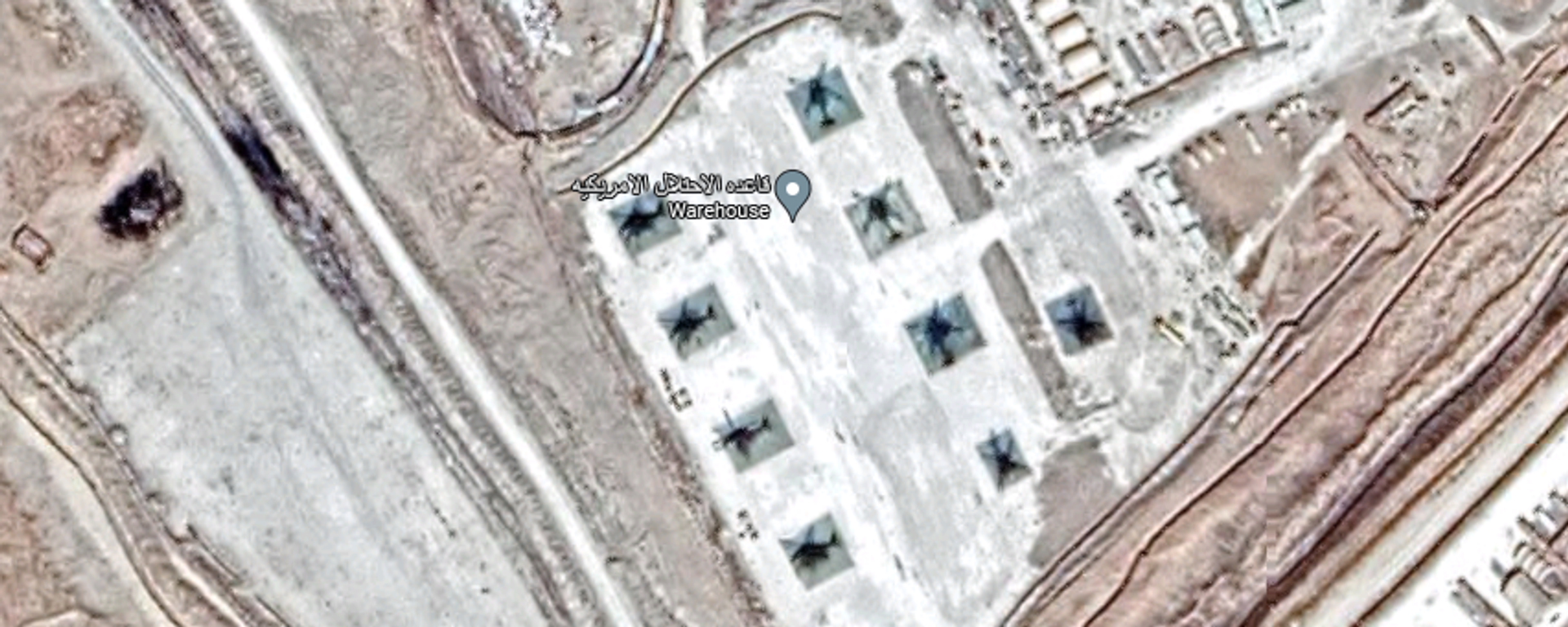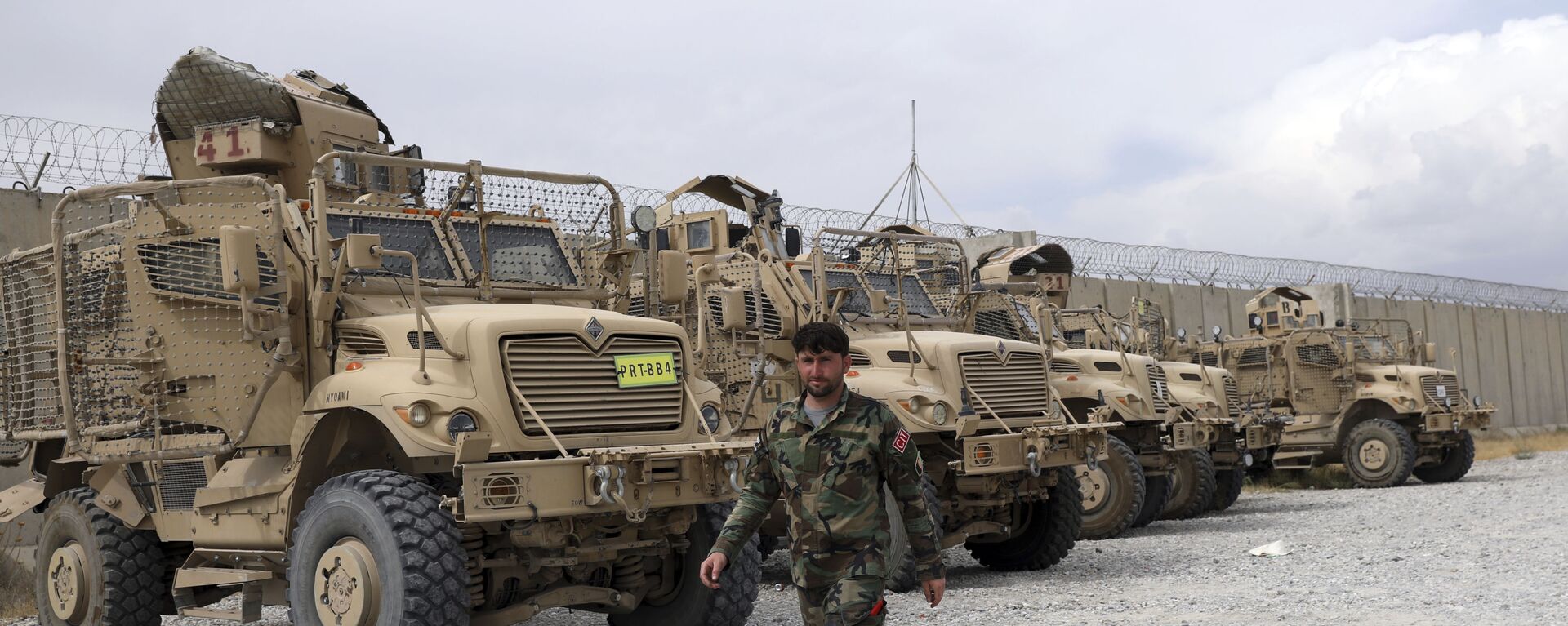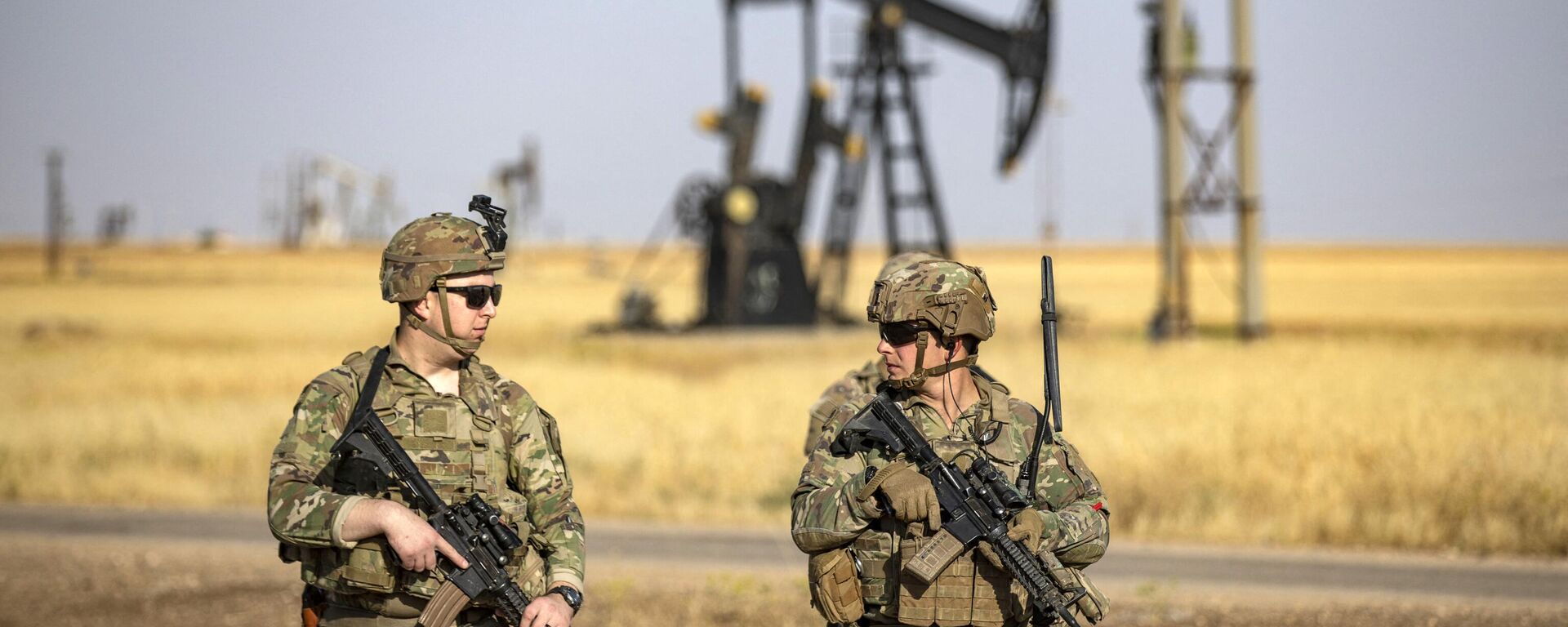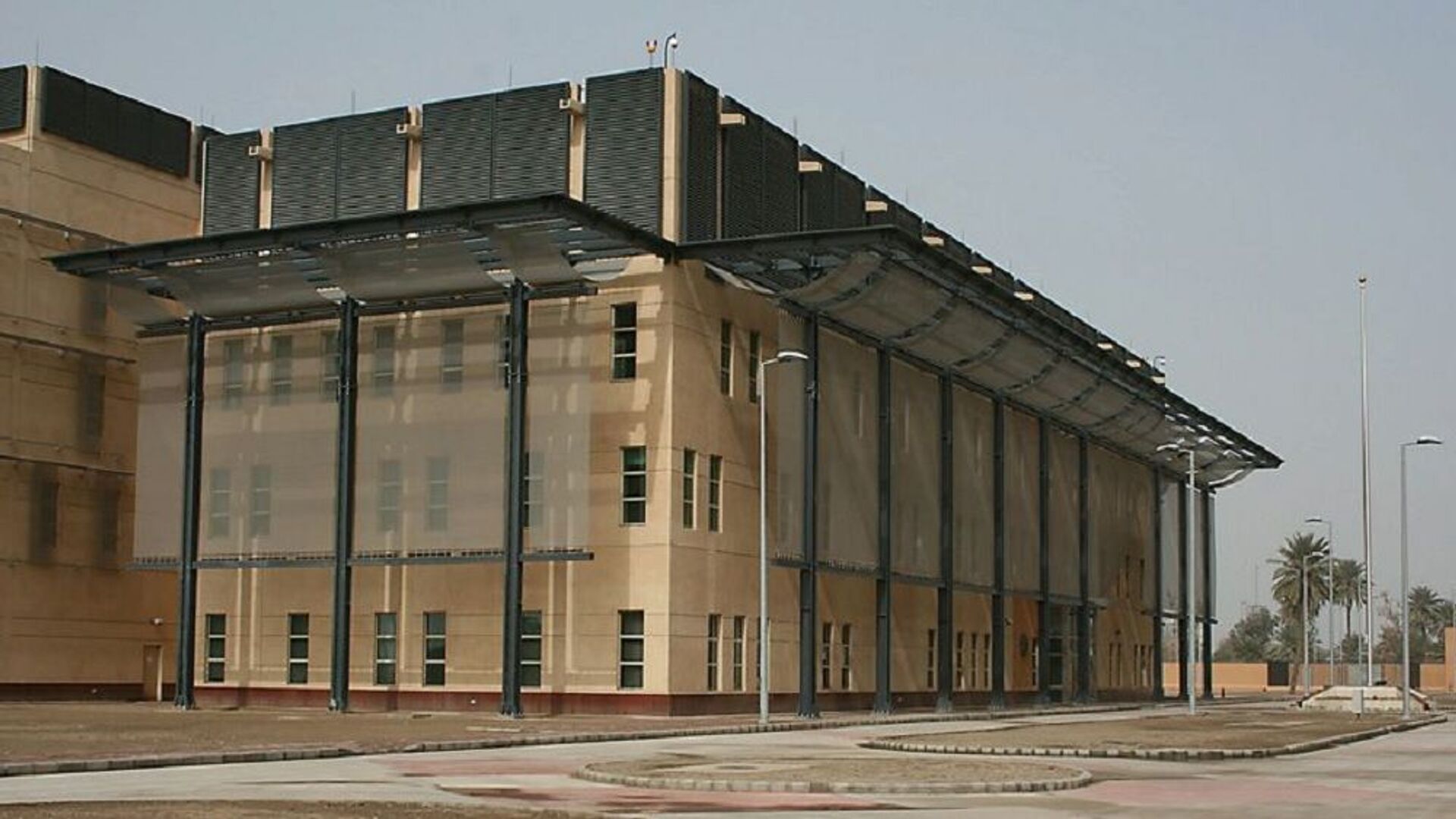https://sputnikglobe.com/20231128/how-taxpayer-money-is-squandered-on-obama-era-power-plant-at-us-baghdad-embassy-1115256454.html
How Taxpayer Money is Squandered on Obama-Era Power Plant at US Baghdad Embassy
How Taxpayer Money is Squandered on Obama-Era Power Plant at US Baghdad Embassy
Sputnik International
The construction of a US Embassy power plant in Baghdad has been mired in controversies with deficiencies found at each stage of the project, and the plant continues to need costly repairs at US taxpayers' expense, as per the State Department's Office of Inspector General (OIG).
2023-11-28T13:24+0000
2023-11-28T13:24+0000
2023-11-28T13:23+0000
us
americas
barack obama
baghdad
afghanistan
oig
us special inspector general for afghanistan reconstruction (sigar)
us embassy
middle east
sigar
https://cdn1.img.sputnikglobe.com/img/107760/61/1077606182_0:1:1001:564_1920x0_80_0_0_0f5821acad60370fc5239e78395f9ebe.jpg
A multimillion power plant project at the US Embassy in Baghdad has come into the crosshairs of the State Department's inspector general, who carried out an audit to determine whether the US government followed specific federal requirements and guidelines "in the planning, design, construction, and commissioning" of the energy facility.The audit results were released in November 2023, shared by US independent media outlet Just the News, indicating errors and procedural violations which eventually led to excessive costs, deficiencies in construction, and costly repairs.The energy facility started operating in 2018; however, since then the plant has experienced serious performance issues, including multiple unplanned power outages and generator failures that have raised security and safety concerns.The problem is that "the Department did not always follow federal and Department requirements and guidelines in the planning, design, and commissioning of the new central power plant at Embassy Baghdad and missed opportunities to correct identified deficiencies at each project phase, even during the construction phase when the deficiencies became apparent," the OIG report stated.For instance, AQM and OBO did not comply with requirements for selecting "the most highly qualified architect-engineer to design the power plant at a fair and reasonable price."Yet another requirement was not to share an independent government cost estimate (IGCE) with a prospective contractor except when it is used in a bargain to obtain a better price. Still, government officials at AQM broke that rule and announced a "guesstimate" price ($1.5 million) for this part of the project prior to any bargaining with the initial contractor, Einhorn Yaffee Prescott (EYP). In response, EYP sent a proposal saying that it would do the work for $1,499,247. After that, the OBO sent an email advising AQM of EYP's selection.When it comes to the whole project's price tag, the OIG found that it cost $76 million more than planned. That included 23 contract modifications, many of which were not approved or related to the original project, and "did not comply with federal and Department requirements for ensuring fair and reasonable prices," according to the watchdog.The commissioning of the power plant was also carried out with massive delays. "OIG found that delaying the commissioning process for the power plant project could have resulted in missed opportunities to adequately plan for commissioning and identify and correct deficiencies earlier in the project," the report read. Still the problems did not end there because "mitigation measures taken since the power plant came online in 2018, while needed, have been and will continue to be costly," the watchdog pointed out.Per Just the News, the State Department did not respond to a request for comment on the findings of the OIG report.This is not the first time US overseas construction efforts have been mired in controversy, with American officials being accused of money waste and alleged corruption. In March 2021, the Special Inspector General for Afghanistan Reconstruction (SIGAR) found that of the nearly $7.8 billion in US capital assets in Afghanistan, about $2.4 billion had either been unused, abandoned, not used for their intended purposes, deteriorated, or destroyed since 2008. This was just one of a series of issues red-flagged by SIGAR. Back in November 2014, the watchdog raised the alarm over renovating Pol-i-Charkhi prison, which had remained incomplete despite five years of construction and $18.5 million spent."The Department of State’s (State) Bureau of International Narcotics and Law Enforcement Affairs (INL) paid Al-Watan Construction Company (AWCC) $18.5 million for work performed on a contract valued at $20.2 million, even though AWCC only completed about 50% of the required work," SIGAR's report stated at the time.The OIG report comes amid an eruption of tensions in the Middle East, with US bases in Iraq and Syria being routinely attacked by Shiite militias. Some conservative US lawmakers and scholars are advocating for Washington's complete withdrawal from the countries, as the US presence there has proven to be costly for Americans in many respects.
https://sputnikglobe.com/20231029/militants-ignore-bidens-warning-rain-down-fire-on-us-forces-in-iraq-syria-1114572582.html
https://sputnikglobe.com/20221118/pentagons-chaotic-inventory-failed-to-accurately-track-us-weapons-given-to-kabul-sigar-says-1104408166.html
https://sputnikglobe.com/20231127/four-reasons-us-troops-should-pull-out-of-syria-and-iraq-asap-1115238924.html
americas
baghdad
afghanistan
Sputnik International
feedback@sputniknews.com
+74956456601
MIA „Rossiya Segodnya“
2023
News
en_EN
Sputnik International
feedback@sputniknews.com
+74956456601
MIA „Rossiya Segodnya“
Sputnik International
feedback@sputniknews.com
+74956456601
MIA „Rossiya Segodnya“
us embassy in baghdad, us military presence in iraq, iraq war, us invasion of iraq, us money waste, office of inspector general, sigar, afghanistan, us invasion of afghanistan, us withdrawal from syria and iraq, us withdrawal from afghanistan, barack obama
us embassy in baghdad, us military presence in iraq, iraq war, us invasion of iraq, us money waste, office of inspector general, sigar, afghanistan, us invasion of afghanistan, us withdrawal from syria and iraq, us withdrawal from afghanistan, barack obama
How Taxpayer Money is Squandered on Obama-Era Power Plant at US Baghdad Embassy
The construction of a US Embassy power plant in Baghdad has been mired in controversies with deficiencies found at each stage of the project, and the plant continues to need costly repairs at US taxpayers' expense, as per the State Department's Office of Inspector General (OIG).
A multimillion power plant project at the US Embassy in Baghdad has come into the crosshairs of the State Department's inspector general, who carried out an audit to determine whether the US government followed specific federal requirements and guidelines "in the planning, design, construction, and commissioning" of the energy facility.
The audit results were released in November 2023, shared by US independent media outlet Just the News, indicating errors and procedural violations which eventually led to excessive costs, deficiencies in construction, and costly repairs.
The report revealed that at the time when the State Department opened the Baghdad Embassy Compound at US Embassy Baghdad in Iraq in January 2009, the compound's electrical power plant already had deficiencies. That prompted the State Department to replace it with a new central power plant. To that end in 2012, the Bureau of Administration, Office of Acquisitions Management (AQM) awarded a contract, and the Bureau of Overseas Buildings Operations (OBO) constructed the plant.

29 October 2023, 11:58 GMT
The energy facility started operating in 2018; however, since then the plant has experienced serious performance issues, including multiple unplanned power outages and generator failures that have raised security and safety concerns.
The problem is that "the Department did not always follow federal and Department requirements and guidelines in the planning, design, and commissioning of the new central power plant at Embassy Baghdad and missed opportunities to correct identified deficiencies at each project phase, even during the construction phase when the deficiencies became apparent," the OIG report stated.
For instance, AQM and OBO did not comply with requirements for selecting "the most highly qualified architect-engineer to design the power plant at a fair and reasonable price."
Yet another requirement was not to share an independent government cost estimate (IGCE) with a prospective contractor except when it is used in a bargain to obtain a better price. Still, government officials at AQM broke that rule and announced a "guesstimate" price ($1.5 million) for this part of the project prior to any bargaining with the initial contractor, Einhorn Yaffee Prescott (EYP). In response, EYP sent a proposal saying that it would do the work for $1,499,247. After that, the OBO sent an email advising AQM of EYP's selection.
"This was due to inattention to the regulations, and as a result, the Department lacked assurance that it had paid a fair and reasonable price for the requested services," the OIG concluded.
When it comes to the whole project's price tag, the OIG found that it cost $76 million more than planned. That included 23 contract modifications, many of which were not approved or related to the original project, and "did not comply with federal and Department requirements for ensuring fair and reasonable prices," according to the watchdog.

18 November 2022, 16:52 GMT
The commissioning of the power plant was also carried out with massive delays. "OIG found that delaying the commissioning process for the power plant project could have resulted in missed opportunities to adequately plan for commissioning and identify and correct deficiencies earlier in the project," the report read. Still the problems did not end there because "mitigation measures taken since the power plant came online in 2018, while needed, have been and will continue to be costly," the watchdog pointed out.
On top of that, the OIG drew attention to the fact that there is no "documented justification explaining the rationale" for kicking off the new central power plant project in 2009 in the first place.
Per Just the News, the State Department did not respond to a request for comment on the findings of the OIG report.
This is not the first time US overseas construction efforts have been mired in controversy, with American officials being accused of
money waste and alleged corruption. In March 2021, the Special Inspector General for Afghanistan Reconstruction (SIGAR) found that of the nearly $7.8 billion in US capital assets in Afghanistan,
about $2.4 billion had either been unused, abandoned, not used for their intended purposes, deteriorated, or destroyed since 2008. This was just one of a series of issues red-flagged by SIGAR. Back in November 2014, the watchdog raised the alarm over
renovating Pol-i-Charkhi prison, which had remained incomplete despite five years of construction and $18.5 million spent.
"The Department of State’s (State) Bureau of International Narcotics and Law Enforcement Affairs (INL) paid Al-Watan Construction Company (AWCC) $18.5 million for work performed on a contract valued at $20.2 million, even though AWCC only completed about 50% of the required work," SIGAR's report stated at the time.
The OIG report comes amid an eruption of tensions in the Middle East, with US bases in Iraq and Syria being routinely attacked by Shiite militias. Some conservative US lawmakers and scholars are advocating for Washington's complete withdrawal from the countries, as the US presence there has proven to be costly for Americans in many respects.

27 November 2023, 18:37 GMT





